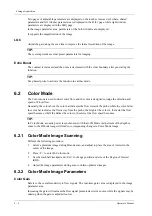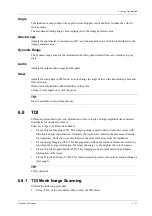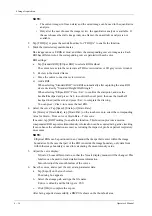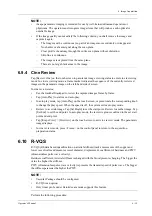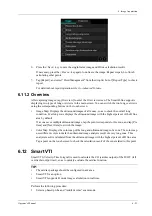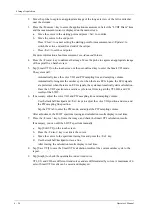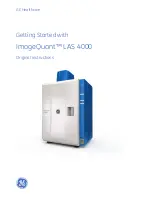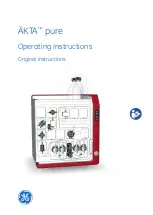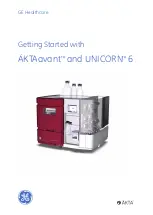
6 - 14
Operator’s Manual
6 Image Acquisition
–
In B or B+Color mode: to enter TVI Mode, parameters of TVI mode will be displayed on
the touch screen.
–
In Power mode: to enter TEI Mode, parameters of TEI mode will be displayed on the
touch screen.
–
PW mode: Press <TDI> or the user-defined key and then press <PW> or <Update> to
enter TVD. The parameters of TCD are displayed on the touch screen.
–
M mode: Press <TDI> or the user-defined key and then press <M> or <Update> to enter
TVM. The parameters of TVM are displayed on the touch screen.
2.
Adjust the image parameters to obtain optimized images.
3.
Press <TDI> or the user-defined key to exit from TDI mode and enter general imaging modes.
Or, press <B> on the control panel to return to B mode.
6.8.2 TDI Mode Image Parameters
In each TDI mode, the parameters that can be adjusted are similar to those in the color flow modes
(Color, PW, and Power). See the relevant sections for details. The following introduces the specific
items in TDI mode.
Tissue State
This function is used for fast image optimization.
6.8.3 TDI Quantitative Analysis
CAUTION
TDI is provided for reference, not for confirming a diagnosis.
NOTE:
To perform the strain and strain curve, the ECG curve is in need in case of the deviation in curve.
TIP:
•
TDI quantitative analysis is an option.
•
The current image (in frozen state) and the saved image can be used in the quantitative
analysis.
•
Only after the user chooses the image review, the quantitative analysis is available.If the user
chooses the static image (only one frame), the quantitative analysis is not available.
It is about analyzing the data of TVI imaging and measuring the velocity of the myocardium with
the cardiac cycle.
Here are three types of curves to perform the quantitative analysis:
•
Velocity-time curve
•
Strain-time curve
•
Strain rate-time curve
–
Strain: Deformation and displacement of the tissue within the specified time.
–
Strain rate: speed of the deformation, as myocardial variability will result in velocity
gradient, strain rate is used commonly to evaluate how fast the tissue is deforming.
Summary of Contents for Anesus ME7T
Page 2: ......
Page 58: ...This page intentionally left blank ...
Page 154: ...This page intentionally left blank ...
Page 164: ...This page intentionally left blank ...
Page 182: ...This page intentionally left blank ...
Page 190: ...This page intentionally left blank ...
Page 208: ...This page intentionally left blank ...
Page 254: ...This page intentionally left blank ...
Page 264: ...This page intentionally left blank ...
Page 280: ...This page intentionally left blank ...
Page 311: ......
Page 312: ...P N 046 018839 00 5 0 ...





